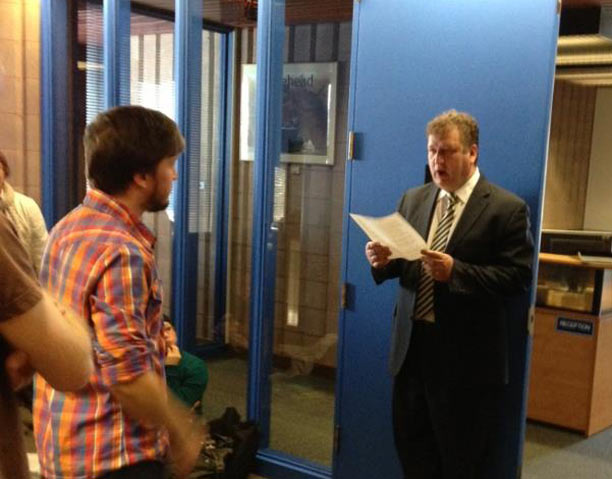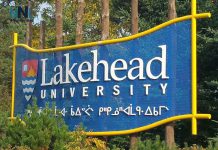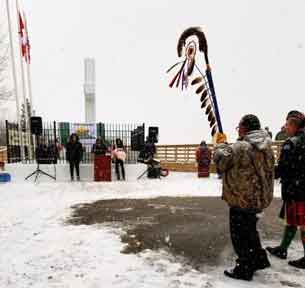
THUNDER BAY – Thirty students are currently camping out in the office of Lakehead President Brian Stevenson’s office. Last week, Lakehead University cut the only mandatory Indigenous Learning credit from the curriculum of the new law school.
Indigenous learning at Lakehead University Law School
Lakehead’s initial application for a law school was rejected by the Ministry of Training, Colleges and Universities as well as The Federation of Canadian Law societies. In its second application, Lakehead promised that the new law school would be unique in its emphasis on indigenous programming, producing lawyers who could approach the law from a Native perspective.
This application was approved. Indi 2805: Native Canadian World Views was part of the curriculum which the Ministry and the Federation agreed to in 2011.
Now, with the approved law school opening in September, Lakehead has begun to scale back Indigenous content.
The course, Indi 2805: Native Canadian World Views, has been offered by Lakehead as part of the Indigenous Learning program for 22 years. It is critical perspective of the issues concerning First Nations and Canadian society has a long history of producing students who both love it and hate it.
The course will be replaced with Law 1530: Native Canadian World Views and the Law. In spite of the similar title, there are some significant distinctions between the two courses.
The course will be reduced from a full year credit to a half credit, be taught by faculty of law rather than indigenous learning and follow a substantially altered course description.
Whereas the primary function of the original course was to ask how the law fits within the world view of indigenous peoples, the new course will ask students how indigenous peoples fit within the law.
In his arguments before Senate, Dean Lee Stuesser pointed out that, to his knowledge, no other law school in Canada has a mandatory non-law course in the curriculum. He suggested that a curriculum of this sort would damage the credibility of the law school.
Some students, however, are not convinced. Over, reading week a group of students calling themselves The Peoples’ Committee for the Integrity of Academic Programming organized around the school’s decision and is calling Lakehead to reconsider.
One member of the Committee was quoted as saying, “I find Mr. Stuesser’s argument both unconvincing and problematic. What he says is unconvincing because Lakehead’s accreditation documents make it quite clear: this program was authorized because it would be unlike those offered by other law schools, not in spite of that fact. What he says is problematic because it suggests there is a difference between indigenous legal education and credible legal education.”
The Committee is also concerned that Lakehead may have attempted to make these changes unnoticed, “As far as we were able to tell, the Chair of Indigenous Learning was not made aware of the proposed changes until four days before the relevant Senate meeting. That he was even informed at all appears to have been the result of an accident. In light of these facts, we highly doubt Lakehead’s decision has undergone proper public scrutiny or has been made clear to any accreditation bodies.”
Sebastian Murdoch-Gibson
special to Netnewsledger
For details on the status of Indigenous Learning 2805, visit the PCIAP’s facebook page: Students for Native Canadian Worldviews.




